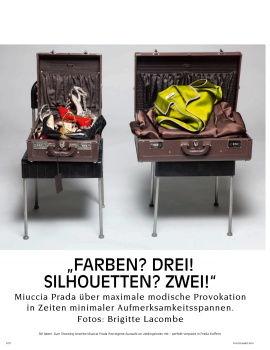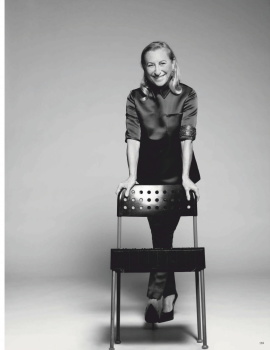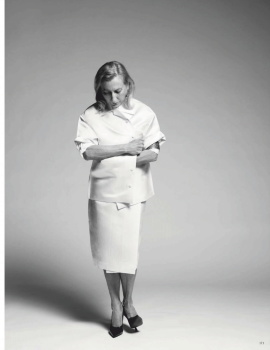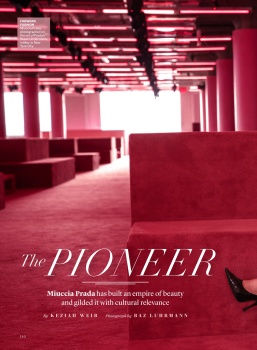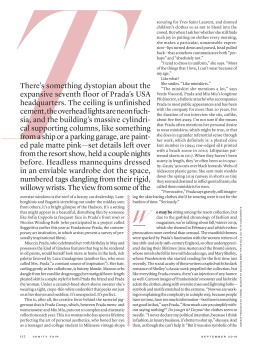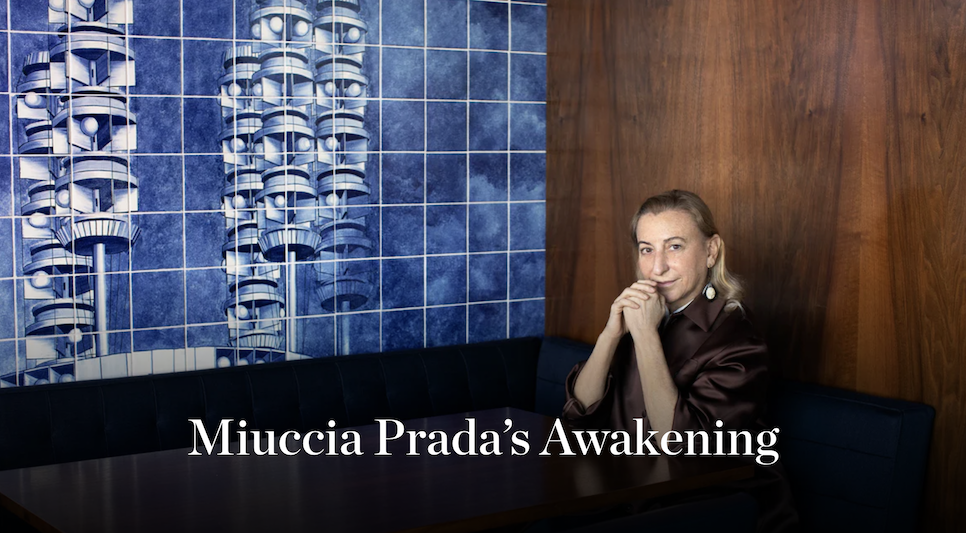You are using an out of date browser. It may not display this or other websites correctly.
You should upgrade or use an alternative browser.
You should upgrade or use an alternative browser.
Miuccia Prada - Designer, Creative Director of Prada & Miu Miu
- Thread starter softgrey
- Start date
dior_couture1245
Fat Karl
- Joined
- Jan 30, 2006
- Messages
- 9,225
- Reaction score
- 4,737
It’s insulting how well she continues to dress herself while she sends the ugliest garbage imaginable down the catwalk these days.
It’s insulting how well she continues to dress herself while she sends the ugliest garbage imaginable down the catwalk these days.
I was about to write this!
GivenchyHomme
Well-Known Member
- Joined
- Sep 3, 2009
- Messages
- 5,086
- Reaction score
- 3,689
The "Pioneer" better get her act together before her brand goes up in flames!
Frederic01
Well-Known Member
- Joined
- Jun 7, 2021
- Messages
- 1,240
- Reaction score
- 2,133
Does anybody with any insider knowledge know what happened to the Prada Cruise/Resort collection this year? Has it been officially scrapped or just postponed?
YohjiAddict
Well-Known Member
- Joined
- May 26, 2016
- Messages
- 3,535
- Reaction score
- 4,721
^Raf Simons didn't find something pretentious enough to serve as inspiration...
Frederic01
Well-Known Member
- Joined
- Jun 7, 2021
- Messages
- 1,240
- Reaction score
- 2,133
highsnobiety.com/MIUCCIA PRADA TALKS PUNK & POLITICAL CORRECTNESS IN THIS NEVER-BEFORE-SEEN INTERVIEW
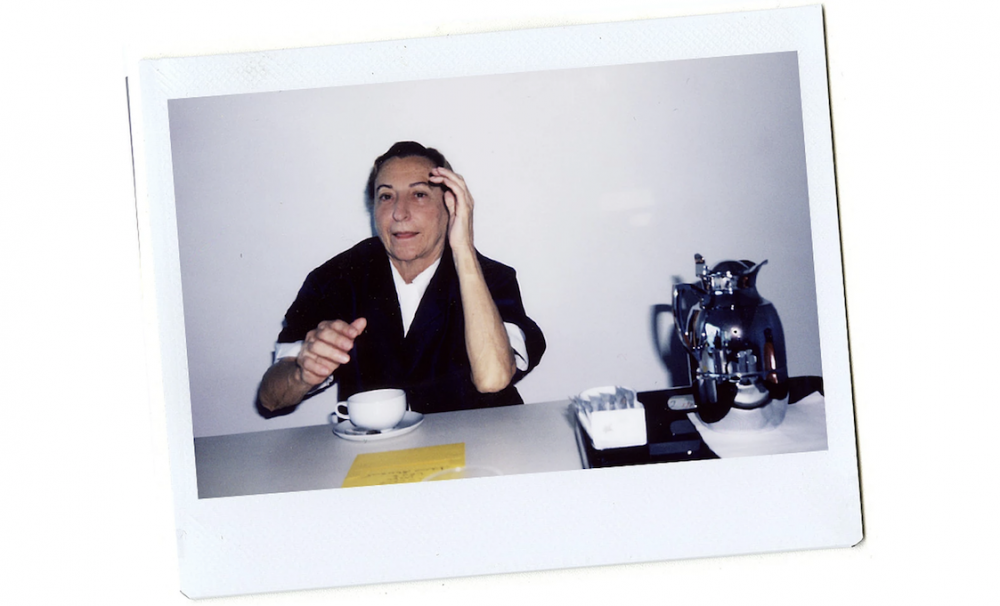
Ann Demeulemeester, Uma Thurman, Marina Abramović, Yoko Ono, Tracey Emin, Jenny Holzer, Debbie Harry, and FKA Twigs all have in common? Aside from being some of the most pioneering women to work in their respective creative industries, they also feature — along with various others — in an intimate new hardback by Mexican-American artist Hugo Huerta Marin.
Huerta Marin, who works a day job as the art director at Abramović’s art studio, began work on Portrait of an Artist: Conversations with Trailblazing Creative Women seven years ago. Inspired by female artists who have "shifted the culture by shaking the structures of our established belief systems," he traversed the globe to speak to his interview subjects in their homes and workspaces. Race, gender, and politics are just some of the subjects that crop up over the course of 450 pages.
Each never-before-published conversation is accompanied by an equally candid polaroid that offers an informal portrait of each woman in her natural state. Industry titans they might be, but they're also people at the end of the day.
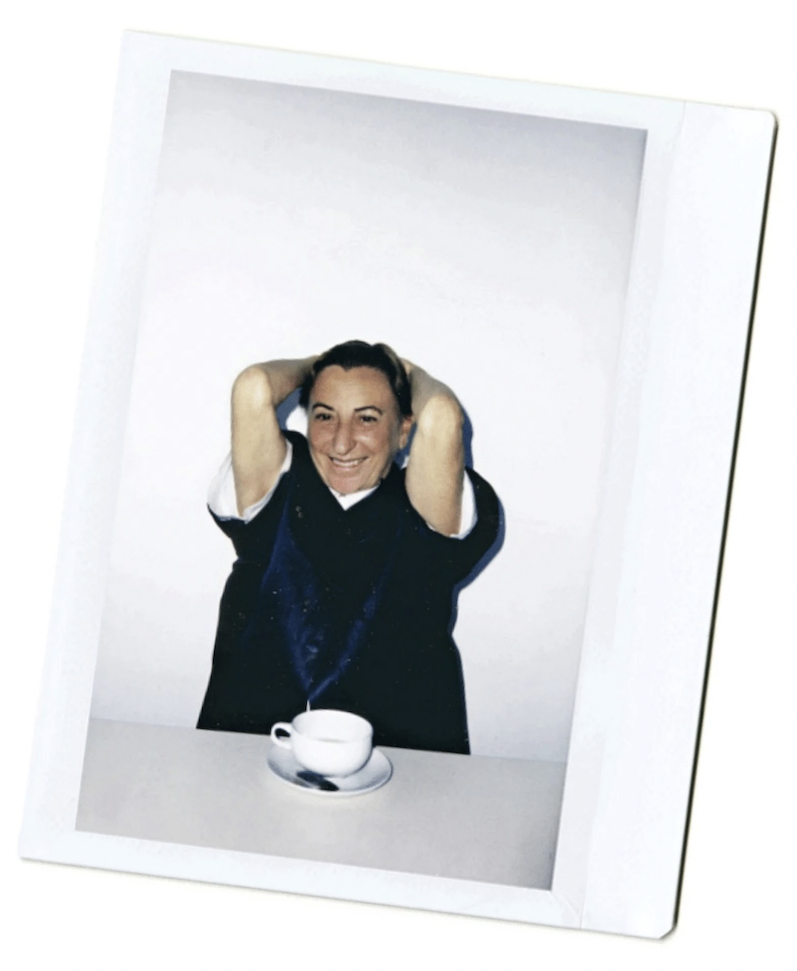
Ahead of the book's release, Highsnobiety is thrilled to present an exclusive edited excerpt from Huerta Marin's fascinating sit-down with none other than Mrs. Prada. Read them discuss everything from mime to politics to luxury fashion below, and order your copy of the book here.
Hugo Huerta Marin: Let’s start at the beginning. Before joining the family business, you received a PhD in political science. Do you think politics influenced the way you started designing?
Miuccia Prada: One of the things that I was involved in before joining the company was politics. I had joined the women’s rights movement and was part of the Unione Donne Italiane [Italian Women’s Union]. I was raised to be political, and in the Prestel Publishing - Not for Reproduction end, politics are really what I carry with me deep down. In a subtle way, I try to bring them to my work.
HHM: You were also trained as a mime. How did this training influence your work?
MP: I do not think it did particularly. It was just a result of the curiosity I had when I was young — to know what was going on, what was new, what was interesting, what was exciting. The Piccolo Teatro was very influential and it was during a time when ideas were changing, new theater, new ... everything. The people and the ideas that circulated influenced me more than the training. The only thing that might have influenced me was the discipline. You needed a lot of discipline to be there — one day of training could consist of just learning how to move your hand back and forth.
HHM: It seems to me that you have an anti-establishment position in fashion. Would you say there is a sense of resistance in your work?
MP: Yes. Resistance is a word that I like a lot. What it means is very complex. I share thoughts with artists because they provide resistance. Clothes were part of the protest, but the origins of those protests go deeper.
HHM: To me, it is interesting to think about clothes as a political tool.
MP: Is fashion political for you?
HHM: Yes, it can be. I can think of Gestapo uniforms...
MP: I was thinking of Louis XIV dressing himself to control politics in the [Roberto] Rossellini movie [The Rise of Louis XIV]...
HHM: Exactly.
MP: Fantastic film.
HHM: I can also think of the punk movement. How can a piece of clothing be political?
MP: You can try to look political in your clothes. But of course, in a very soft way, you should dress according to your thoughts; I always say that you should not dress as a sexy bombshell to conquer a rich man, only if that is how you feel. It should not have a purpose. What has a lot to do with politics is your mind, not what you choose to wear. Who cares? I always say that you can wear whatever you want, because it is a free choice. I do not think there is a politically correct dress code — there were times I went to demonstrations wearing Saint Laurent and vice versa. In the end, any gestures can be political. Politics are much more than clothing.
HHM: Yes. But I also think there have been a few moments in history when the language of a culture was shifted by clothes. Do you think fashion can still be that revolutionary?
MP: I think that is a reaction. What I am trying to say is that some people complain that nothing new happens in fashion anymore, but fashion reflects what is happening in society. At the time of the miniskirt, there was the women’s revolution, people reacting politically, intellectually, and also in terms of clothes. Clothes were part of the protest, but the origins of those protests go deeper.
HHM: What are your thoughts on the concept of uniforms?
MP: I have always loved uniforms because they can set you free from having to care about and choose what to wear. I was preoccupied with the concept a few years ago. Even if I’ve never made them for my shows, I love them because in them you can hide who you are. You are free, liberated. I always say that clothes can help you, mainly when you are in a good mood (laughs). When you are in pain or suffering, or when you are sick — when tragedy hits — you could care less about fashion.
HHM: How has Prada changed as fashion houses have expanded? Is there a moment when you think a big house becomes too big?
MP: No, I never thought that. I enjoy the idea of expanding because I have always thought that the idea of making clothes for a small group of chic and sophisticated people is limiting. That is too easy for me, and being confronted with the big world outside is so much more exciting and challenging. I am very interested in that because it is difficult.
Now, with so-called globalization, in theory, you should know about everything, everywhere. You try to catch part of something or all of it, because you are obliged by your job to do so. I also very often say, whenever I have conversations with artists at the Fondazione [Prada], that I am very proud of my job because it is the only thing that obliges me to be in touch with reality. Art is more theoretical — you can say and do whatever you want. When it comes to fashion, you have to really confront yourself. Sometimes you believe something is fantastic, but no one wants it. Other times, people want something you hate. These confrontations are really interesting because you learn something.
HHM: It’s interesting to think about it even from a cultural point of view — how in some places, designers are restricted in the way they design clothes: You can’t show the legs in some countries, bodies are smaller in China and bigger in Eastern Europe, you can’t show nipples in America, and so on.
MP: In fact, political correctness can also be a limitation on creativity, but it is very interesting, When it comes to fashion, you have to really confront yourself because if the group you are designing for is small, you can do whatever you want. Now, there are so many different audiences and instinctively, you just go with it, because it is a form of respect. Some people would say that we are taking away freedom, but I think you should respect the views of others. It is a big issue, but again, an interesting one.
HHM: I am also curious to know how a fashion house can understand the concept of luxury, particularly when it comes to the Eastern and the Western market.
MP: I must say that the concept of luxury is very similar everywhere (laughs).
HHM: You have said, “Fashion never opened itself to the ‘ugly.’” Do you think things have changed over the years? That we are witnessing more of an aperture to the strange and the bizarre?
MP: When I started my job, there was a kind of taboo about that. I found it wrong, because everywhere in film, in art, in theater, there was the nasty and the ugly. And that was the most interesting part. But in fashion? Only beauty, bourgeoisie, perfection. As a fashion I like beauty, but I am much more interested in ideas designer, I always wanted to break those rules and introduce “real life” into fashion. The task is not yet done, because so far, fashion still tends to expose classic beauty. For me, exploring beyond that concept was simply natural. What is the exact meaning of beauty?
HHM: Also, Prada’s cultural recognition extends beyond fashion.
MP: Yes, I believe so. I ascribe relevance to different things. My ideas are political, and that means I struggle for whatever they stand for — for culture, for understanding, for equality, and so on. And the instrument I have is fashion, and I also have the Fondazione. I actually had to develop that because fashion was not enough of an instrument (laughs). I always used to say that to be a fashion designer was the worst. I was ashamed for a very long time. But later, I decided that it was the instrument I had, so I tried to practice what I believed through my company. In fact, we always try to expand to culture, architecture, movies — we try to move, to give more substance, to give more food for thought. For instance, there is Miu Miu’s Women’s Tales, a continuous collaboration with female directors to whom we give a platform to produce and showcase their ideas on feminity and vanity. It is a place for conversations about these subjects. In general, I would say that I like beauty, and I am very interested in the aesthetics of art, architecture, design, or whatever it is, but I am much more interested in ideas.
Frederic01
Well-Known Member
- Joined
- Jun 7, 2021
- Messages
- 1,240
- Reaction score
- 2,133
YohjiAddict
Well-Known Member
- Joined
- May 26, 2016
- Messages
- 3,535
- Reaction score
- 4,721
Miuccia Prada's Awakening
By Tim Blanks
PARIS — For Miu Miu’s return to the arena of live presentations, Miuccia Prada is collaborating with the Moroccan multi-media artist Meriem Bennani, who has made a video that will be revealed with the show and worked into the new collection’s online launch. It’s the first time Prada has collaborated in such a way, though she’s been asked a lot. “I never liked the idea because, at the end, it was only just to use each other, to sell more.” She was also sensitive to exploiting art for her own devices, “not using people to make myself more beautiful, more clever.” Now Prada has clearly had a change of heart. “I think I gave up so much I could have done,” she says ruefully. “I see that in collaborating with an artist, I share ideas with her so she can introduce something else to enlarge them.”
Over the past ten years, Miu Miu’s Women’s Tales initiative has commissioned twenty short films from female directors, but, as Prada points out, it’s not widely known. The collaboration with Bennani feels like a concerted effort to give the artist’s contribution greater weight. Prada has bought her work. “She’s really tough,” she says. She is also political, which allows the designer to have a different kind of voice in her work.
The idea of having other voices speak for her, maybe saying something she would find it difficult to say, is a new feeling for Prada. “This is the first experiment where actually I had more or less everything behind it because I said okay, the video is going to be her, whatever she does. It’s her voice completely.” Tellingly, Prada feels the collaboration as it appears online will be more illuminating. She thoroughly enjoyed the experience of producing films rather than fashion shows during the last 18 months — “Much more difficult, much more complicated, but also much more rich” — she didn’t want to turn her back on that audience with a straight runway redux.
Miuccia has, of course, been collaborating with Raf Simons on the creative directorship of Prada’s signature collection, an unprecedented arrangement in fashion. Miu Miu, on the other hand, has always been her personal vehicle, the perverse, willful and spirited little sister of grown-up Prada. On Monday morning, she is, for instance, wearing a plain checked shirt and navy nylon blouson but she has a huge gold necklace round her neck, Van Cleef and Arpel from the 70s. “This summer, I wanted to buy something a bit vulgar,” she says with a sly chuckle.
With Raf’s arrival at the main line, Miu Miu may take on a new significance for her. “I can probably do a better Miu Miu. Prada is always more formal. And the Fondazione Prada is important. But with Miu Miu, I can sneak more in, I can be more out there with people.” She’d like to be more radical. “But you have to be able to. One thing is having the will, the other is translating your will into reality.” Maybe it’s the prospect of that challenge that has helped boost Miuccia’s state of mind. “I felt fear for five years,” she admits. “Fear was my only sentiment.” She lost four of her best friends, and, plagued by death and anxiety, even before the pandemic, her mood was terrible. “Now I have a vision of something that I can do.” She claims that every single day, she debates herself: should I stop working, start a different kind of adventure, introducing more ideas in different forms? “You have to be inspired. Maybe I hope I’m inspired because I’ve been in a good mood now for three or four months.”
Now I have a vision of something that I can do.
Despite her angsty recent past, Prada’s experience with the pandemic was actually the instrument of her opening-up. “I never did so much and never thought so much in my life as in [these] past two years,” she says of her lockdown in Milan. “And I think it was very productive. I really changed a lot in my mind.” The biggest change was her attitude to technology. “For me, it was kind of revolutionary. It’s the first time I really faced the importance of it.” Her skepticism, which she says was probably a generational thing, evaporated once she realised tech’s relevance. And then came the question: how can I be more relevant?
“The relevance comes when you bring reality into your work,” Prada answers her own question.
But it’s not an easy answer because it hinges on confrontation. “Conflict is the story of my life,” Prada declares. That’s no surprise given that her greatest conflict is with the instrument of her good fortune. “Clothes are a part of life, but they’re not the meaning of life,” could be her motto. “Clothing is a little moment of fun, it’s useful, I wouldn’t underestimate the importance of clothing. But it’s a moment in your day,” she says at one point. “I think that people still consider fashion with some disregard,” she suggests at another. And, resignedly, “The concept of a piece of art or a movie is a big deal. A dress at the end is a dress, but it’s my instrument so I have to use it.”
As a self-described leftist feminist, famously canvassing for Italy’s Communist Party in the 1970s while wearing Yves Saint Laurent, Prada felt ashamed. “All my friends being politicians and intellectuals and me being in fashion meant it was very tough for me… I felt like this stupid girl, but I was not stupid. And actually, the person that gave me more value, the biggest intellectual, was the one who appreciated fashion the most.” With the passage of time, shame has yielded to a degree of embarrassment. “The world is such a chaos. Now finally we have it all in front of us. Anything you do is everywhere. Anything you say is everywhere. And how do you relate your little world of fashion to all the problems of the world? I feel embarrassed all the time because of my privilege. And because I think that people should be more interested in what is happening, more proactive, more political.”
She says she still holds more or less every single one of her beliefs from those days. “I changed a bit, but deep down, no.” Of course, she’s been asked to become a politician. “I say ‘when I am old‘, and now that I’m old I say ‘when I’m really old.‘ If I stopped working, I could do something else, but I’d have to stop working because as a rich fashion designer, I can’t do politics. That I’m sure about.” Maybe if she found a group she could be part of, she muses, “to be part of something if I would believe in it. But probably I would have done that already. And now the reality of politics is so bad that I can probably be much more political in my job, and my other activities.”
Speaking of which, Fondazione Prada in Milan is currently featuring a show cycle about neuroscience, an idea Miuccia nursed for years, until one morning she woke up, called the philosopher and ex-Mayor of Venice Massimo Cacciari and arranged to meet him in a bar, where she told him all about her idea. “After five minutes, he understood. So he started introducing me to these other scientists. They called the ten most important institutions in neuroscience from Harvard to China to Japan to wherever and they said they were happy to participate, but even happier if Fondazione Prada could become a permanent space for this encounter with neuroscience. And I said yes.” Miuccia is enraptured by the scientific miracles she has been exposed to. Ideas are her religion.
She has always been fierce, almost hysterical she says, about not combining her worlds, but she’s changing her mind here too. “Now I’m thinking that, with all that I’m doing, I should probably try to find a way to mix more... find a way to introduce more reality basically, more ideas, more thought, into the fashion conversation in my work.” Later, she’ll add, “I want to find a way to introduce more intelligence in my job because fashion is such a strong instrument. So I want to use it more. I want to try to give more tools — this is going to sound generic — to be more useful.”
With Simons as co-creative director, she’s no longer alone at the top. “By definition, it’s different from before. And I’m very open to his ideas because otherwise why did I call him. And actually, we are working together very well. We never had any problem of any kind, because if he doesn’t like something we don’t do it and vice versa. But I’m happy and he’s a very honest person, which is very good.”
Her longtime design director Fabio Zambernardi is still part of the equation, but Prada describes Simons as “my reference. And this is the first year we work together, so you have to learn to do it. Also, to have this part of somebody else is a bit liberating. It’s not only on my shoulders.” She hopes that means she’ll get more time for the rest of her interests. Time to stop and smell the flowers maybe, though it hasn’t happened yet. “Yesterday, I was thinking about the charm of flowers,” says Miuccia says. “How can it happen that flowers have this?” The wonders of nature await her.
Frederic01
Well-Known Member
- Joined
- Jun 7, 2021
- Messages
- 1,240
- Reaction score
- 2,133
^^ Thank You YohjiAddict! 

Similar Threads
- Replies
- 245
- Views
- 90K
- Replies
- 78
- Views
- 11K
- Replies
- 63
- Views
- 10K
Users who are viewing this thread
Total: 2 (members: 0, guests: 2)


